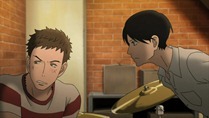 |
 |
 |
If you ask me what my favorite NoitaminA series this season is, my answer might have to be “What time is it?”
Seriously – as a huge NoitaminA fan (albeit a disappointed one lately) I don’t say it lightly, but this is the best pair of shows the block has offered in my view. Not only are they both superb on their own, but they complement each other perfectly – Tsuritama is surrealistic, bright, joyous and full of bombast. Sakamichi is sober, subtle, layered, realistic and beautiful. Each manages to tell a compelling story about wonderful characters in a totally different way. Last time Sakamichi had a slightly down week, merely “great” as opposed to its usual sublime, while Tsuritama was off-the-grid fantastic. This time Tsuritama was “only” great, while Sakamichi was back on it’s “A” game. How in the world do I choose?
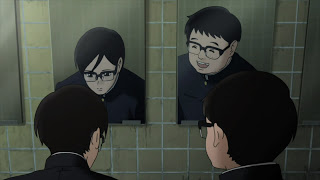 One of the things I love about Sakamichi especially is the way it weaves themes of social change into the lives of its characters. Whereas some series are set at a certain time for atmosphere, this one could only be in the mid 60’s, as the pace of societal change was terrifying “normal” people everywhere. In Japan it mostly took the form of student unrest, but the music world certainly felt it too – jazz, while once viewed suspiciously as the music of outsiders, had found an adoring audience in Japan, and was suddenly under threat from a strange outsider, rock. And this was never more apparent than in the strange mop-top foursome from Liverpool that had all the girls screaming. To fans of jazz, reacting in this manner to music defied logic – perhaps even more so to the Japanese character than most.
One of the things I love about Sakamichi especially is the way it weaves themes of social change into the lives of its characters. Whereas some series are set at a certain time for atmosphere, this one could only be in the mid 60’s, as the pace of societal change was terrifying “normal” people everywhere. In Japan it mostly took the form of student unrest, but the music world certainly felt it too – jazz, while once viewed suspiciously as the music of outsiders, had found an adoring audience in Japan, and was suddenly under threat from a strange outsider, rock. And this was never more apparent than in the strange mop-top foursome from Liverpool that had all the girls screaming. To fans of jazz, reacting in this manner to music defied logic – perhaps even more so to the Japanese character than most.
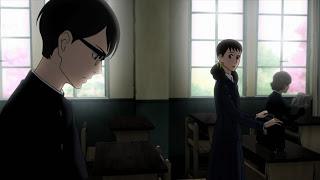 I could never choose between jazz and rock – any more than between Tsuritama and Sakamichi – because I love them both. And just as I don’t have to neither did music lovers then, though convincing them of that would largely be impossible. Rock and Roll, of course, is a creature born of jazz – and blues, and R & B – but music was undergoing a period of intense change just as the rest of society was, and the pace was frightening for almost everyone. Sakamichi not only ties this conflict into the theme of societal divisions forming in the 60’s, but also into Kaoru’s personal journey. As a Navy brat, he’s spent his whole life trying to avoid getting close to people – because he’s paid the emotional price of doing so and being yanked away from them, and doesn’t want to go through that again. As rock threatens jazz, so its presence here threatens to rip Sentarou away from Kaoru, and his anxiety disorder rears its ugly head again after lying dormant, fed by the fear of abandonment that’s so much a part of him.
I could never choose between jazz and rock – any more than between Tsuritama and Sakamichi – because I love them both. And just as I don’t have to neither did music lovers then, though convincing them of that would largely be impossible. Rock and Roll, of course, is a creature born of jazz – and blues, and R & B – but music was undergoing a period of intense change just as the rest of society was, and the pace was frightening for almost everyone. Sakamichi not only ties this conflict into the theme of societal divisions forming in the 60’s, but also into Kaoru’s personal journey. As a Navy brat, he’s spent his whole life trying to avoid getting close to people – because he’s paid the emotional price of doing so and being yanked away from them, and doesn’t want to go through that again. As rock threatens jazz, so its presence here threatens to rip Sentarou away from Kaoru, and his anxiety disorder rears its ugly head again after lying dormant, fed by the fear of abandonment that’s so much a part of him.
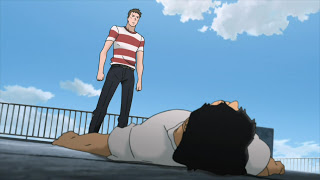 Both the musical and personal threats are personified in Mastsuoka Seiji (Okamoto Nobuhiko, always a genki addition to a cast), a classmate of Sen’s in Class 10 and a fellow art club member with Yurika. He’s an odd boy, complete with his own fang – small, a little effeminate with a bowl haircut – and he sees something in Sentarou that interests him immediately. This is intentionally irritating character who will no doubt annoy the audience – but he’s supposed to, and as played by Okamoto-san I rather like him for the completely different sort of character he is from the rest of the cast. He’s as weird and exotic as rock and roll, and as a poor kid with a house full of siblings, he’s decided than singing in a rock band is his ticket to helping his family – and that Sentarou is the drummer he needs. He’s already got Yamaoka and Maruo on-board, and to lure Sen he loans him a copy of “Please Please Me” (the Japanese import edition).
Both the musical and personal threats are personified in Mastsuoka Seiji (Okamoto Nobuhiko, always a genki addition to a cast), a classmate of Sen’s in Class 10 and a fellow art club member with Yurika. He’s an odd boy, complete with his own fang – small, a little effeminate with a bowl haircut – and he sees something in Sentarou that interests him immediately. This is intentionally irritating character who will no doubt annoy the audience – but he’s supposed to, and as played by Okamoto-san I rather like him for the completely different sort of character he is from the rest of the cast. He’s as weird and exotic as rock and roll, and as a poor kid with a house full of siblings, he’s decided than singing in a rock band is his ticket to helping his family – and that Sentarou is the drummer he needs. He’s already got Yamaoka and Maruo on-board, and to lure Sen he loans him a copy of “Please Please Me” (the Japanese import edition).
When Kaoru sees this is Sentarou’s bag, it’s as if he’s found strange hairs on his lover’s pillow – and given the increasingly complex romantic issues also playing out here, this creates an extremely difficult and awkward situation. Kaoru is still working through his own feelings for Ritsuko, and beginning to suspect Yurika’s feelings for Brother Jun (I hadn’t realized that was Yurika’s letter in Jun’s overstuffed Tokyo mail slot). Mainly he seems to be trying to push Sen and Ritsuko together, and when Sen asks him for advice on a date with Yurika, “Bon’s” actions are hard to read. He initially discourages Sen on what seem like sensible grounds, but when he says she’s simply too good for him Kaoru fears he went too far (he did). It’s hard to say with certainty just why Bon does what he does here – he’s in an extraordinarily dangerous minefield, and I actually think he’s navigating it fairly well. I think in the end he’s actually trying to do the right thing as he sees it – to preserve his friendship with Sen, and keep Ritsuko from being hurt. His own feelings for Ritsuko certainly haven’t dimmed, as witness his momentary thoughts of performing “My Favorite Things”, one of her favorite songs, as a way to try again to win her heart – but he checks himself, at least for the moment.
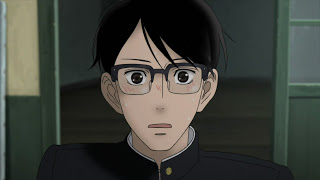 For Ritsuko, the movie that song comes from – “The Sound of Music” – is a metaphor for her missed chance with Sentarou (in those days if you didn’t see a movie in the theater, you didn’t see it). And for Bon, after all the work he’s done to try and preserve his friendship with Sen, his friend’s flirtation with rock and roll – and Seiji – is a betrayal. He curses Sen for disloyalty, and curses himself for letting his guard down and allowing himself to care too much. “After all, I’ve made it this far all on my own. No problem… at all.” While Seiji’s courtship of Sen is no doubt quite calculated, I for one wouldn’t mind seeing Sentarou play rock and roll drums at the school festival (and a little more live music in general) – and Kaoru should remember that he didn’t forsake classical when he befriended jazz. There’s room in the world for Mozart, Coltrane and The Beatles – and there’s room in our hearts for more than one friend, and perhaps even more than one love. For a boy with a fear of abandonment as strong as Kaoru’s – and as well-earned – that’s going to be a hard and painful lesson to learn.
For Ritsuko, the movie that song comes from – “The Sound of Music” – is a metaphor for her missed chance with Sentarou (in those days if you didn’t see a movie in the theater, you didn’t see it). And for Bon, after all the work he’s done to try and preserve his friendship with Sen, his friend’s flirtation with rock and roll – and Seiji – is a betrayal. He curses Sen for disloyalty, and curses himself for letting his guard down and allowing himself to care too much. “After all, I’ve made it this far all on my own. No problem… at all.” While Seiji’s courtship of Sen is no doubt quite calculated, I for one wouldn’t mind seeing Sentarou play rock and roll drums at the school festival (and a little more live music in general) – and Kaoru should remember that he didn’t forsake classical when he befriended jazz. There’s room in the world for Mozart, Coltrane and The Beatles – and there’s room in our hearts for more than one friend, and perhaps even more than one love. For a boy with a fear of abandonment as strong as Kaoru’s – and as well-earned – that’s going to be a hard and painful lesson to learn.
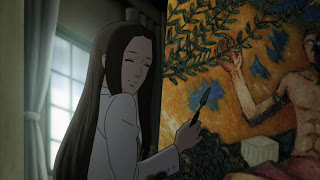 I know the reactionaries will be all over Kaoru’s tearful reaction to the thought of losing Sentarou as a friend, but I think back to the amazing film Colorful – and how it accurately portrayed the fact that often in a difficult adolescence, the best friend is the most important relationship – and the one that saves us from despair. As fast as the pacing is here, I don’t expect that Watanabe-sensei will take emotional short-cuts, and I know they aren’t in Kodama’s writing. Things are complicated and I don’t expect them to sort themselves out neatly – no one is in love with the right person (they rarely are) and Junichi is back in town, apparently on a bender and in real trouble. Rock and roll and Seiji aren’t going away, and neither are the problems of Kaoru and the main cast. Ultimately I think Sakamichi no Apollon is more about friendship and love of music than anything else, and that’s where I expect the focus to be in the second half of the series.
I know the reactionaries will be all over Kaoru’s tearful reaction to the thought of losing Sentarou as a friend, but I think back to the amazing film Colorful – and how it accurately portrayed the fact that often in a difficult adolescence, the best friend is the most important relationship – and the one that saves us from despair. As fast as the pacing is here, I don’t expect that Watanabe-sensei will take emotional short-cuts, and I know they aren’t in Kodama’s writing. Things are complicated and I don’t expect them to sort themselves out neatly – no one is in love with the right person (they rarely are) and Junichi is back in town, apparently on a bender and in real trouble. Rock and roll and Seiji aren’t going away, and neither are the problems of Kaoru and the main cast. Ultimately I think Sakamichi no Apollon is more about friendship and love of music than anything else, and that’s where I expect the focus to be in the second half of the series.
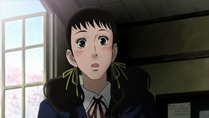 |
 |
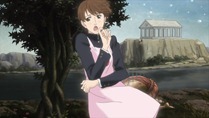 |
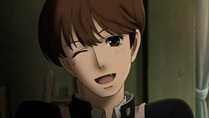 |
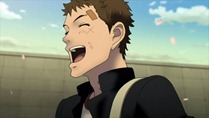 |
 |
 |
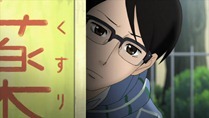 |
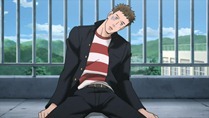 |
 |
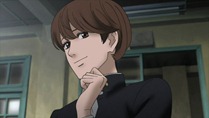 |
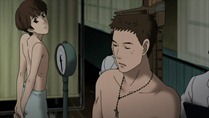 |
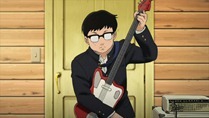 |
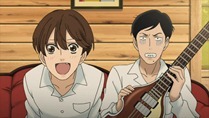 |
 |
 |
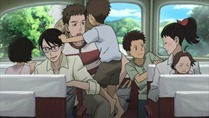 |
 |
 |
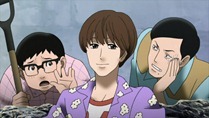 |
 |
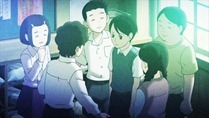 |
 |
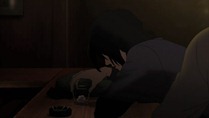 |


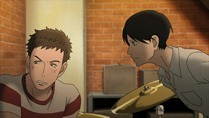
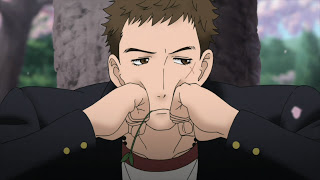
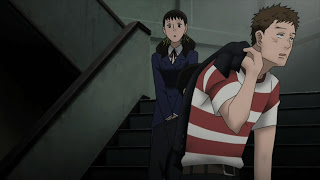


Ishruns
May 18, 2012 at 1:55 amThat couch that he looked very comfortable makes me think that Seiji is lying about his household situation. It would be a cliched reason for Sen to get mad at him for lying about his life, but still I can't help but think it.
Bon, the homophobia is strong in this one.
admin
May 18, 2012 at 2:45 amLooked like a standard rec room sofa to me, but who knows.
Ishruns
May 18, 2012 at 3:20 amWould a poor family in the 1960s have several red western sofas?
admin
May 18, 2012 at 3:25 amWe don't even know for sure its his house.
Ishruns
May 18, 2012 at 3:58 amGood point. I just assumed because he looked so comfortable while the other two didn't, which would weird if it was their own home.
BTW can you tell me what the name of this anime is
http://www.youtube.com/watch?src_vid=OAyc2b85yjA&annotation_id=annotation_952415&v=-ssm8sibwFU
Fight scenes were simply spectacular. Literally on a different level.
Anonymous
May 18, 2012 at 10:17 amSeiji is comfortable pretty much everywhere. He can wear a tunika with a Santa hat and a tambourine in front of a crowd, and he makes it look like it's the most natural thing in the world.
Btw it wasn't his house, it was Yamaoka's as we'll see from the next episode (if they include that part from the manga).
SQA
May 18, 2012 at 10:27 amIshruns:
The TV series is apparently just called "K", though I don't know when it'll air. Seems like a summer series.
Anonymous
May 18, 2012 at 4:09 amIt's "K". Just "K" I think 😛
jebnemo
May 18, 2012 at 4:14 amI guess the other guy gets to play bass.
admin
May 18, 2012 at 5:34 amThat's how it always works with garage bands… Why do you think Paul ended up on bass after George joined?
jebnemo
May 19, 2012 at 1:19 amDang, I get no credit for my subtle joke. Anyway, do you know how to tell there's a (rock) drummer at the door?
Speaking of poverty, I wonder who owns the instruments? I can't ID the guitar, but that's very much like a Hofner 500/1 Violin Bass (no surprise there). I guess there might have been knock-offs in 1966 Japan. The contemporary Hofner model seems to sell for around $880.00.
debussylover
May 18, 2012 at 6:02 amI couldn't stop with this episode. I HAD to read the manga. I spoiled it for myself but oh man, I can't wait for these next episodes…. hahaha.
zw
May 19, 2012 at 5:31 amIt was painful to even imagine myself in Kaoru's shoes. The girl he loves is in love with their best friend (and in Kaoru's case, his first best friend). And that friend now has a slight interest in Rock & Roll. Like you said, fear of abandonment… although I must say that Kaoru's over-reacting here, but he has an emotional package and that's how he knows how to react. He might feel sorry afterwards, but his first reaction to anything involving Sen & Ricchan are his true feelings.
On another note Enzo, I started (and finished) watching Ghost Hound after seeing/reading more than a couple of times how you enjoyed the series and Ono Kensho's acting as Tarou. What I did not expect was how much I enjoyed hearing Kyuushuu-ben, and how I recognized Hosoya Yoshimasa voiced a very minor character in episode 1. The same case as Sakamichi as this series set somewhere in Kyuushuu. Speaking of dialects, Hosoya also voiced Arata with Fukui-ben. I haven't watched that many series that heavily featured another dialect apart from the standard Japanese and Kansai-ben. I watched a movie called Hanamizuki and they used Hokkaido-ben.
admin
May 19, 2012 at 5:55 amI wish my understanding of the language was good enough to really get the nuances of dialect. Kansai-ben is really the only one I can pick up on without being told.